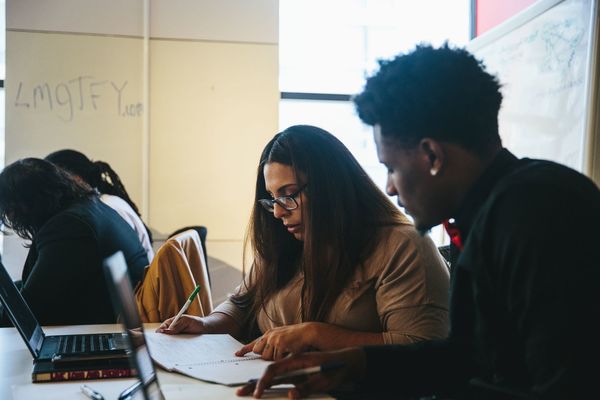At LEO, our commitment to evidence is unwavering[1]. Over the past two months, our partners—nonprofits who support those experiencing poverty—have faced an unprecedented test. As many fight for survival, we at LEO have been amazed by their resilience and ongoing commitment to evidence. In this series, we’ll highlight the stories of these nonprofits to showcase how they are adapting to the realities of COVID-19, and the innovations of those on the front lines of the war on poverty.
Read the stories from NPower and Helping Restore Ability.
--------
Before they’ve even stepped through the door, every applicant to i.c. stars has already passed the first test. Surviving in Chicago’s inner city meant overcoming adversity. It requires both resilience and creativity. Now for the easy part: unleashing this creative problem solving toolkit onto the challenges of programming in a career in tech. In 2019, i.c. stars joined forces with LEO to validate its approach and support its expansion across the mid-west.
i.c. stars, now operating across three cities, has a two-decade-old take on a timeless problem: how do you help those experiencing generational poverty control their own destiny, and make a positive impact in their communities? The two-year program pairs tech training with a leadership curriculum, to ensure its graduates go on to make opportunities for others as well as for themselves. The students first complete a four-month intensive coding boot camp, before being paired with corporate clients seeking a technology prototype.
The students are predominately people of color in their mid-twenties, a third of whom have children. i.c. stars provides significant help, matching each student with a case manager, counselors, and coaches. Each student in the twenty-person cohort is required to show up on time, as well as to participate in outside-of-class community-building events like local business leader talks--known as High Tea.
Engaging LEO
Over the past two decades, i.c. stars’s reputation blossomed in Chicago. But as co-founder Sandee Kastrul began pushing to expand to Milwaukee and Kansas City, she noticed that funders increasingly wanted rigorous evidence for their investments. Given its technology DNA, i.c. stars had a history of capturing metrics for its program success, including job placement rate, earnings increases, pursuit of higher education, and charitable giving, among others. But when it came to something like a randomized controlled trial (RCT) to really determine what impact the program was having on its graduates, i.c. stars didn’t know where to start.
Like so many of their students, i.c. stars found itself in a cohort in the fall of 2019. Alongside several innovative nonprofits from around the country, i.c. stars leadership worked with the LEO team to design a study that measured how well the boot camp worked for its graduates. Together, they worked through the issues around recruitment, program size, and randomization--they were set to begin in 2020.

COVID and the new reality
The coronavirus hit i.c. stars where their RCT plans were most vulnerable: recruiting enough students for a full cohort. While the curriculum lends itself relatively flexibly to remote learning, the intake process itself is an intensive, in-person set of skills assessments and interviews. Moreover, recruiting the cohorts was done primarily at in-person community events. The stay-at-home order exacerbated the gap between those applying with existing access to computers and a stable connection, to those who were looking to break out from their surroundings.
i.c. stars remains more committed to evidence than ever; it’s the key to their growth. They’ve worked with LEO to determine if the changes in the intake process will affect their results. Taking a page from their students’ playbook, i.c. stars is demonstrating resilience in uncertain times. They’ve moved High Tea online, and Sandee started a new gathering she calls “old-school all-skate,” an end-of-week debrief which has solidified a culture of collective optimism and determination.
As they expect from their students, i.c. stars has kept their commitments. They started the latest cohort enrollment on time, ensuring its impact is known and arming them to spread across three states soon. For i.c. stars, just like their students, the hardest step is already done.
[1] Not only is it in our DNA... what would our 6 full time and over 30 affiliate professors at Universities across the country do if they couldn’t research?!